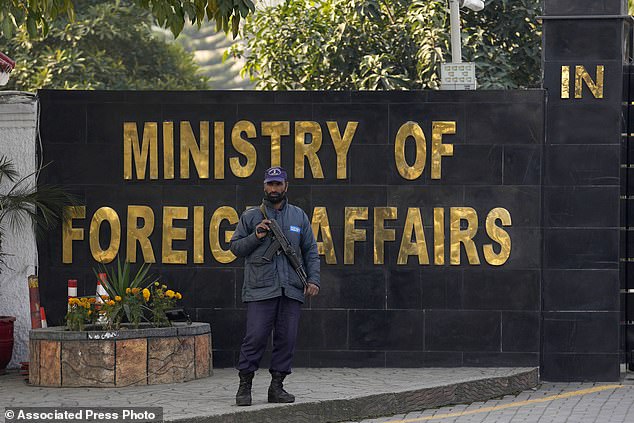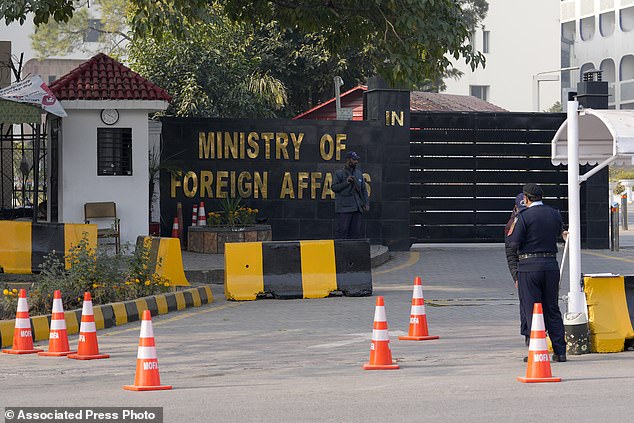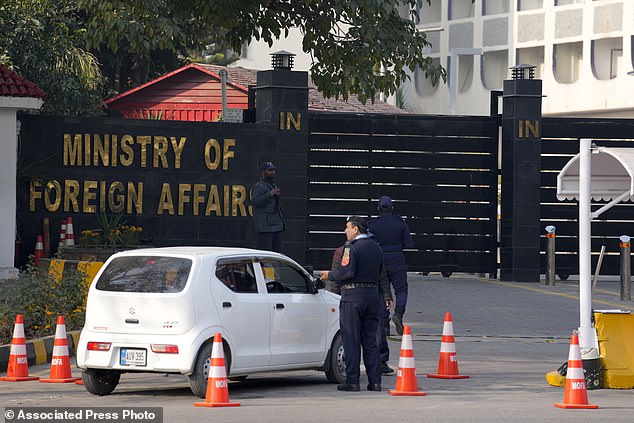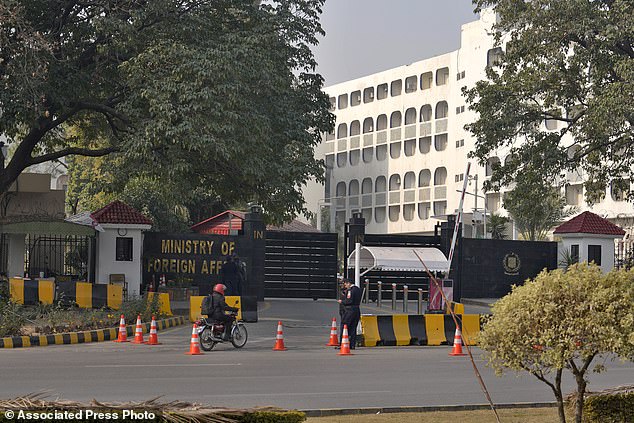Middle East tinderbox threatens to explode as Pakistan air force launches airstrikes on Iran at ‘militant targets’ it says are behind missiles that killed two children
Pakistan’s air force has launched retaliatory airstrikes on two suspected “militant positions” in Iran, days after an Iranian airstrike killed two children in the southwestern part of the country.
Airstrikes in the provinces of Sistan and Baluchestan on Thursday killed at least seven people – and threaten to further inflame tensions between the two nations.
The attacks also jeopardize already shaky diplomatic ties between the two neighbors, as Iran and nuclear-armed Pakistan have viewed each other with suspicion for decades.
They also raise the threat of full-blown war breaking out in the Middle East, already plagued by Israel’s now months-long conflict with Hamas.
Iraq, meanwhile, has recalled its ambassador from Iran for consultations after Iran admitted on Tuesday to carrying out the missile and drone operation in West Pakistan’s Baluchistan province.
Pakistan’s air force has launched retaliatory airstrikes on two suspected “militant positions” in Iran, days after an Iranian airstrike killed two children in the southwestern part of the country. Pictured: A Pakistani flag flies at a lookout post in Islamabad, Pakistan, in 2022
Photos from eastern Iran – near Saravan, some 20 miles (32 kilometers) from the border – appear to show smoke engulfing much of the city early Thursday, while fire continued to burn in one of the targeted buildings – an unspecified location. Pakistani armed forces sources labeled it a ‘Militant Compound.’
While local Iranian sources continue to report significant damage to several residential buildings and possible civilian casualties near the city, Pakistan’s Foreign Ministry issued a statement justifying the attacks.
“This morning’s action was taken in light of credible information of imminent large-scale terrorist activity,” it said.
“This action is an expression of Pakistan’s unwavering determination to protect and defend its national security against all threats.”
Iran also carried out airstrikes in Iraq and Syria late Monday in response to a suicide attack claimed by Islamic State that killed more than 90 people earlier this month.
Pakistan’s Foreign Ministry described their attack as “a series of highly coordinated and specifically targeted precision military strikes.”
Several insurgents are active in Iran and Pakistan, including the Sunni separatist group Jaish al-Adl, which was targeted by Tehran in its own attack. They all have a common goal: an independent Baluchistan for ethnic Baluch areas in Afghanistan, Iran and Pakistan.
Pakistan’s Baluchistan province, as well as the neighboring provinces of Sistan and Baluchestan, have been experiencing a low-level insurgency by Baluch nationalists for more than two decades.
Pakistan named its operation ‘Marg Bar Sarmachar.’ In Iranian Farsi, ‘marg bar’ means ‘death to’ – and it is a famous saying in Iran that has referred to both the United States and Israel since the 1979 Islamic Revolution.
In the local Baluch language, ‘sarmachar’ means guerrilla and is used by the militants operating in the cross-border region.
A deputy governor of Iran’s Sistan and Baluchestan province, Ali Reza Marhamati, gave casualty figures from Thursday’s strike in a telephone interview, saying the dead included three women and four children.
He did not immediately elaborate, other than to say that the dead were not Iranian nationals.
HalVash, an advocacy group for the Baluch people, shared images online that appeared to show the remains of the ammunition used in the attack.
A number of houses were said to have been affected in Saravan, a city in Iran’s Sistan and Baluchestan province. It shared videos showing a mud-walled building being destroyed and smoke rising over the strike immediately afterwards.
Thursday’s development came a day after Pakistan recalled its ambassador to Tehran over Tuesday’s attacks by Iran in Pakistan’s southwestern Baluchistan province. Iran claimed it was basing itself on a militant Sunni separatist group.
The attack was strongly condemned by Pakistan, which labeled it a “blatant violation” of its airspace and said two children were killed.

A police officer stands guard at the main entrance of the Pakistani Ministry of Foreign Affairs in Islamabad, Pakistan on Thursday

Police officers stand guard at the main entrance of the Pakistani Ministry of Foreign Affairs in Islamabad, Pakistan on Thursday

Police officers search a car at the main entrance of the Pakistani Foreign Ministry in Islamabad, Pakistan on Thursday

Police officers stand guard at the main entrance of the Pakistani Ministry of Foreign Affairs in Islamabad, Pakistan on Thursday
